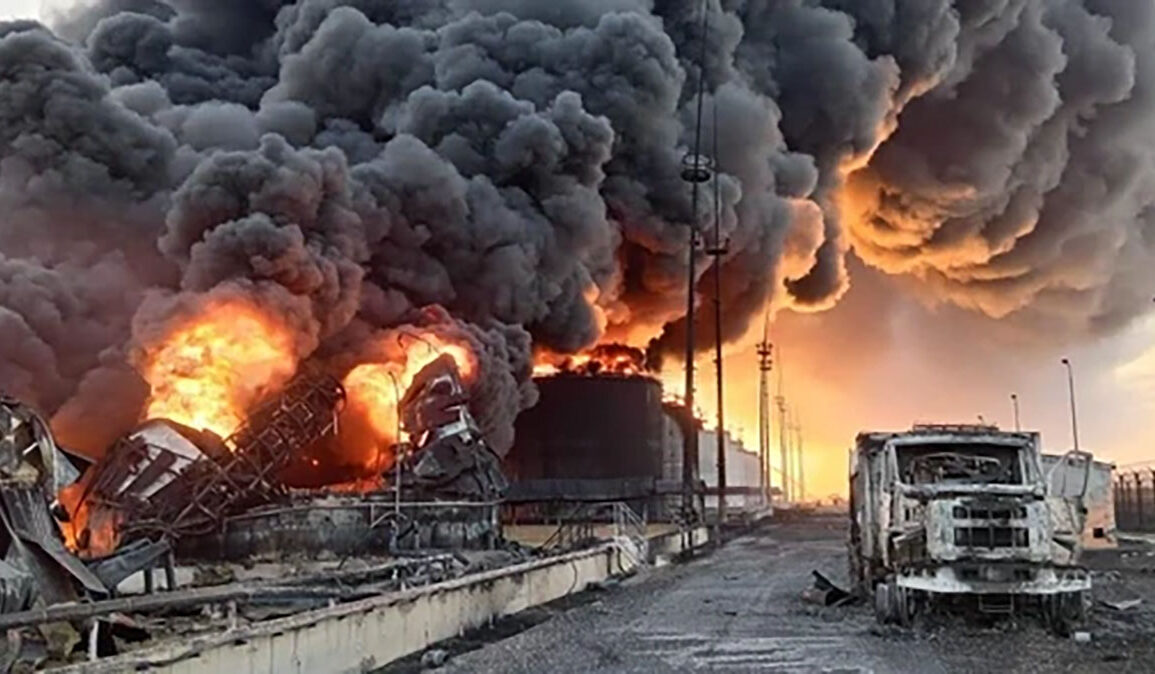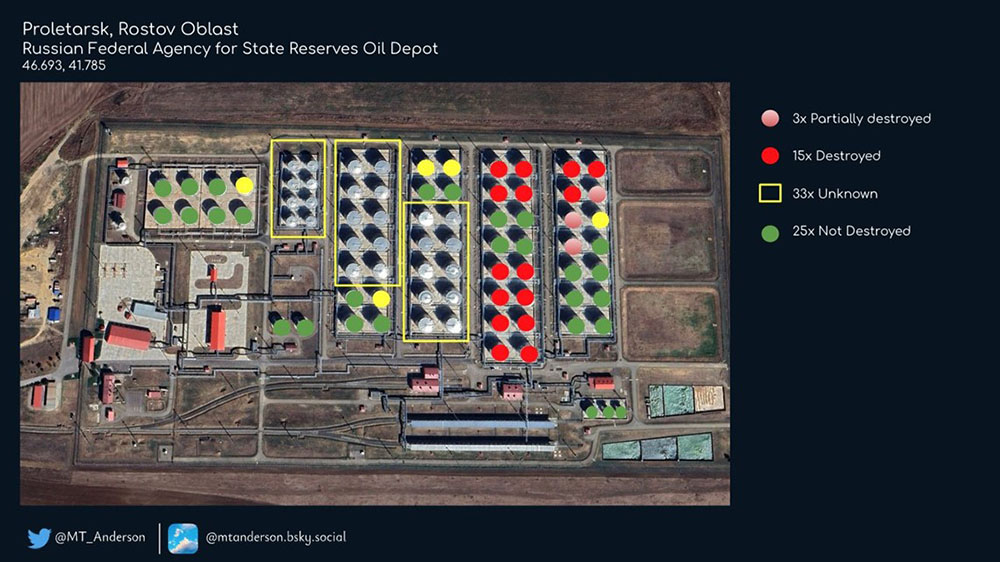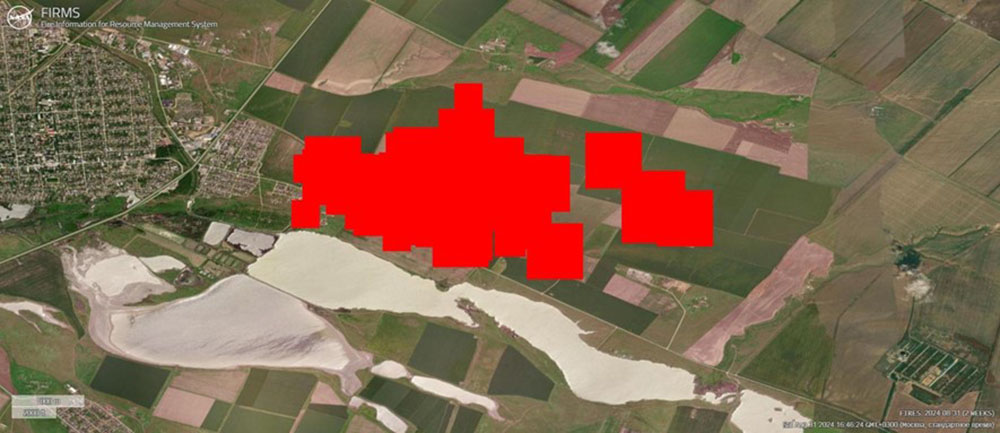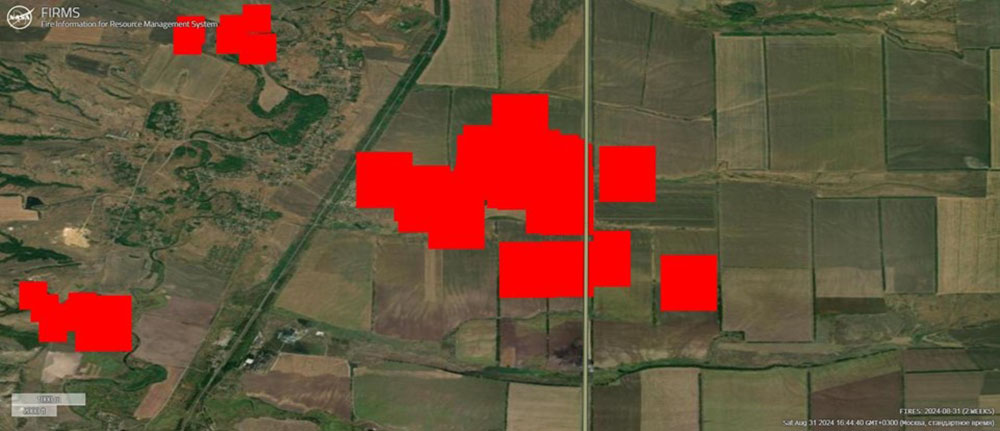In September, 2024, the consequences of fires at two Federal State Reserve Agency oil storage facilities in Rostov Oblast were recorded. According to the minimum estimate, fuel worth seven billion rubles burned down.
As revealed in the course of our investigation, for a number of reasons, including subjective ones, several years before the start of the war, underground reservoirs were reconstructed into above-ground ones. As a result, they became vulnerable.
One Hundred Thousand Tons — by Minimum Calculations
In August, the Ukrainian army struck two strategic objects of the Russian military-industrial complex in Rostov Region — the oil storage facilities «Base No. 7» in Kamensk District and «Flagman» in Proletarsk. «Flagman» had been burning from August 18, «Base No. 7» — from August 28. TASS news agency reported that the fire in Proletarsk was extinguished on September 4. «Base No. 7» was still burning at the time of publication.
«Flagman» previously called «Kavkaz» was renamed on April 21, 2023. «Base No. 7» known as «Atlas,» was renamed on April 28, 2023. Both enterprises also closed information about their management on the specified dates.
«In the photograph, you can see that two fuel reservoirs are burning, and several more show signs of damage. It is known that the attack was this night,» Radio Liberty comments on satellite photos from August 28.
According to NASA FIRMS data from August 31, the damage area from each fire exceeded seven square kilometers, and OSINT investigator MT Anderson had published a damage scheme of «Kavkaz» on August 23. Already then, 15 reservoirs were destroyed, 3 partially damaged — that’s 90 thousand tons of fuel. The condition of another 33 reservoirs is unknown. At «Atlas,» at least 3 reservoirs were destroyed — that is, another 15 thousand tons.
Underground Storage and Concrete Shelters
The enterprises were part of the Federal State Reserve Agency and provided fuel supplies to the Russian Armed Forces — aviation kerosene for the Southern Military District. The reservoirs were underground, but in the 2000s they were raised to the surface. The Federal State Reserve Agency stores various types of products for state needs and reports to the Government of the Russian Federation.
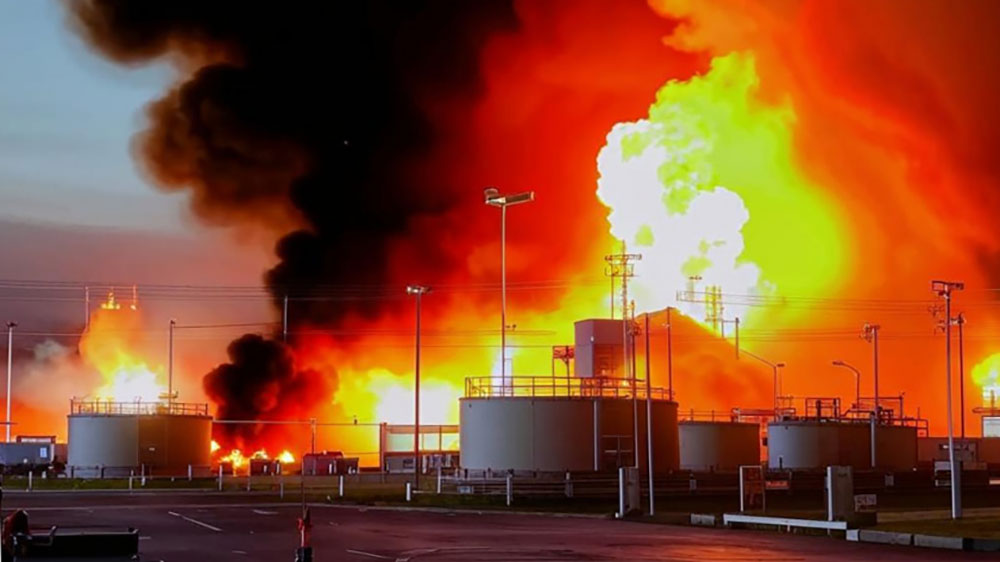
The «Atlas» and «Kavkaz» facilities were built in 1962 according to designs by Moscow Design Institute No. 6. The reservoir parks store fuel for jet engines, diesel fuel, and other petroleums. The plants deliver petroleum products to storage facilities by railway. «Kavkaz» had 32 reservoirs with a capacity of 5,000 cubic meters of fuel each, «Atlas» had 64 such reservoirs.
«The oil storage facilities were built and put into operation literally within a year. Right after the Cuban Missile Crisis. The country was in a state of readiness for war, so the reservoirs were placed underground,» explains an oil industry expert who requested anonymity in an interview with «Polygon.» Similar storage facilities were built in other regions of the country.
Into Open Field, According to Legislation
The storage facilities were deteriorating — over time, due to saline soils and groundwater, the reservoirs began to rot. This was especially critical in Proletarsk — there, salt marshes emerge on the surface near the enterprise. In 2003, the Federal Authority for Mining and Industrial Supervision introduced emergency safety requirements that both enterprises did not meet. The management of the enterprises had to repair the reservoirs and equip the storage facilities in accordance with new legislative standards.
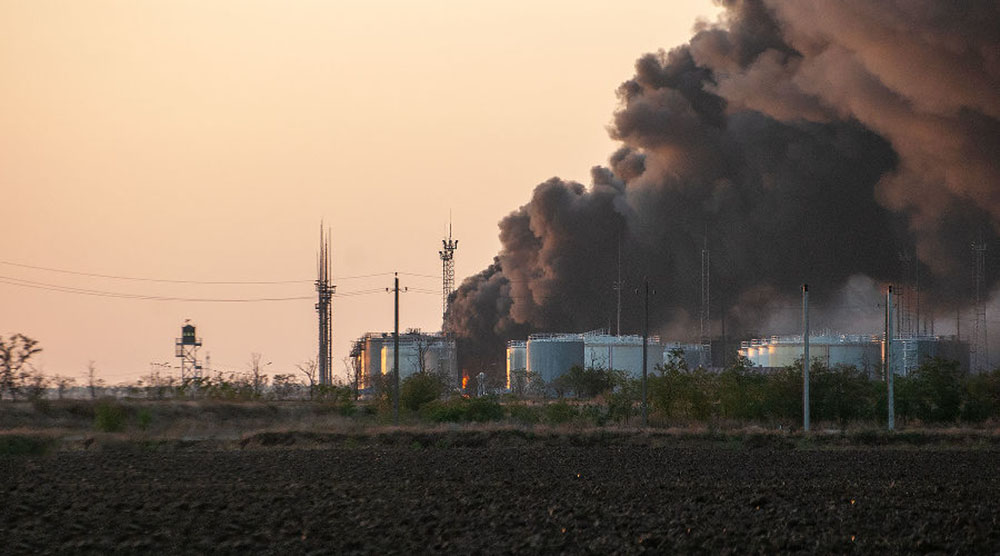
«The authorities demanded, and employees led them to an open field and asked, where should we install the new equipment? But rules are rules. The project was drowned up and the storages successfully pulled to the surface. Previously, only the loading platform could be damaged. Now the entire ‘Kavkaz’ is blazing. ‘Atlas’ has more than seventy reservoirs, twenty burned down,» comments one of the designers.
Underground repair work is expensive and requires complex, high-cost technologies. The Federal State Reserve Agency took advantage of the ban on underground storage for reconstructed and newly constructed petroleum product warehouses in regulatory documents, declared reconstruction, and raised the storage facilities to the surface.
The above-ground «Atlas» project was approved in 2009, in 2019 the underground storage was dismantled and an above-ground complex with 74 reservoirs was built. «Kavkaz» began raising its reservoirs earlier. Work on it continued for 15 years, and in August 2020, the Ministry of Defense and Federal State Reserve Agency conducted exercises at the base to practice fuel distribution for the army.
«This is what remains. For the record [filming]. This is a museum. This is what remains. Fifteen years of construction, destroyed in a week,» notes a voice off-camera in a video recording of the fire made from the territory of «Kavkaz.»
Fateful Decision
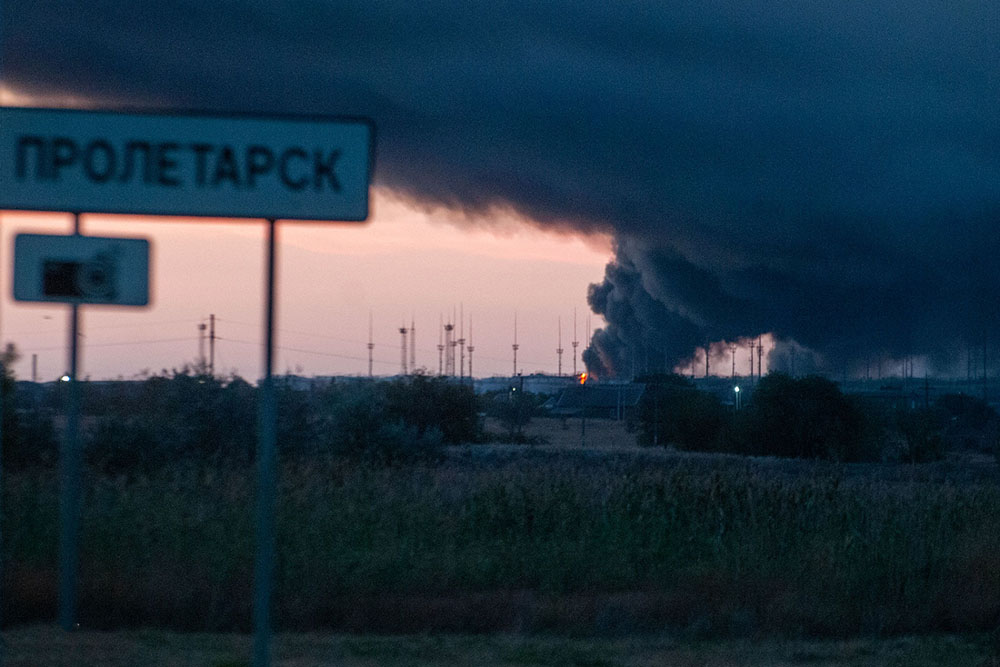
At «Kavkaz,» the reservoirs were simpler and quickly deteriorated, but at «Atlas» there were reinforced concrete shelters. Vertical low cylindrical structures with concrete foundations, covered with concrete slabs. Such a reservoir would be difficult not only to penetrate — even hitting it would be hard. If they had hit, only one would have burned — five thousand tons.
The Federal State Reserve Agency could have made do with repair work and left the reservoirs underground. Current legislation prohibits not operation, but construction of new trench reservoirs in case of reconstruction or newly constructed oil and petroleum product warehouses. However, both Federal State Reserve Agency oil storage facilities in Rostov Oblast were decided to be excavated.
Viktor Demochko has been managing «Atlas» for more than twenty years. At the beginning of his «career,» the court fined the resourceful manager 130 thousand rubles for money laundering at the enterprise. The illegally obtained amount exceeded one million rubles, which constitutes particularly large income. Demochko claims that the storage reconstruction was a consequence of the ban on trench reservoirs. His interpretation of the regulations made it possible to request a budget for building essentially a new production facility.
But even this did not go smoothly — in May 2024, the newly named «Base No. 7» sued the company «Yuzhtehmontazh» demanding restoration of underground chamber tightness, replacement of 19 gas analyzers, as well as electric motors, electric drives, foam suppression valves, and restoration of the automatic fire suppression system functionality. The facility demanded the court recover almost 18 million rubles from the defendant. «Yuzhtehmontazh» company carried out the reconstruction of the reservoir park, including installation of vertical and trench reservoirs, technological pipelines, overpasses, fire suppression stations, and other facilities. Based on the content of the lawsuit, the consideration of which was postponed once again on August 5, it can be concluded that «Atlas» after reconstruction had a number of technical problems, one of which was a faulty fire suppression system.
«Kavkaz» director Viktor Litvinenko has been managing the enterprise since 2018. For a year before him, the position was held by Yulia Savitskaya. Until 2017, Igor Kushnarev was director for many years. Kushnarev also managed a petroleum product storage and transportation enterprise from 2008 to 2011 and a gambling organization from 2002 to 2004.
According to BBC Russia calculations, since the beginning of the year, the Armed Forces of Ukraine has attacked oil refining enterprises and infrastructure located in Russia and in occupied Crimea and Luhansk about seventy times. In May 2024, the Ukrainian army had already deployed drones to the «Kavkaz.» Then the fire was quickly extinguished. After that, the management apparently decided that the incident would not repeat — and filled the reservoirs to the brim. The «Zenit» oil depot in the city of Kotelnich, Kirov Region, was attacked by the Armed Forces of Ukraine on August 28 — simultaneously with «Atlas.»
Consequences of Storage Elevation — a Thousand IL-76 Flights
One hundred thousand tons of burned fuel is the minimum calculation that can be confirmed. What does this mean for the Russian Armed Forces of the Southern Military District? The maximum fuel tank capacity of an IL-76 is one hundred tons, a T-90M tank — about one ton. Fuel losses at the two enterprises by the most modest estimate — seven billion rubles. In fact, the damage is much greater, especially considering logistics costs and other expenses.
The «Atlas» and «Kavkaz» oil storage facilities were supposed to meet the needs of the Southern Military District. There are no other enterprises that could replace them, says the expert. If it becomes impossible to operate them after the fires, the military will have to organize supplies from other regions, that is, after losing a gigantic amount of fuel, increase logistics costs. It’s worth noting that attacks on fuel supply routes — the railway — have already occurred. But even if the oil depots continue to operate, considering their proximity to the zone of military operations, they can no longer be considered safe.
«There Are No Protected Objects in Wartime»
The above-ground storage facilities of the enterprises are equipped to prevent production accidents, and even then, with fire safety violations, as follows from the lawsuit by «Atlas» itself. Air defense system defense could protect above-ground reservoirs from missile attacks, but the Federal State Reserve Agency did not find it necessary to install it. In the case of «Atlas,» military production is located nearby, on whose territory air defense operates — therefore it was more difficult to inflict serious damage on it. «Kavkaz.Realities» wrote about possible reasons for the absence of protection at «Atlas» and «Kavkaz» in material about fuel losses.
«We live in such a technologically saturated environment that wherever something hits — there will be trouble. There are no protected objects in wartime. We need to restore peace. There are two main problems now: war and people in the Kremlin. Construction of the Novocherkassk Nuclear Power Plant is being prepared. Nuclear energy is never safe. Building a nuclear power plant in an agglomeration of two million people is madness. And there’s no energy shortage. There are worn-out networks and substations. They want to build it just to steal a lot right away. They want to launch the first power unit in 2036, work is already underway. Rostov’s civil society would wake up roughly in 2035. There are no independent environmental organizations. Those that existed have been declared foreign agents,» comments the candidate for Deputy of the State Duma, member of the Federal Bureau of the «Yabloko» party Alexander Efimov.
In August, regulatory authorities presented a draft of updated regulatory legislation on industrial safety of oil and petroleum product warehouses. «Federal Norms and Rules in the Field of Industrial Safety ‘Rules of Industrial Safety of Oil and Petroleum Product Warehouses,'» approved by order of the Federal Service for Environmental, Technological and Nuclear Supervision dated December 15, 2020, No. 529, contained that very ban on construction of trench reservoirs during reconstruction and construction of enterprises, which the management of «Atlas» and «Kavkaz» referenced to excavate the storage facilities. The new edition partially repeals this ban: «75. Storage of oil and petroleum products in sunken and underground reservoirs for newly constructed and reconstructed hazardous production facilities of oil and petroleum product warehouses is not permitted, except for constructed and reconstructed hazardous production facilities of oil and petroleum product warehouses subordinate to the Ministry of Defense of the Russian Federation, the Ministry of the Russian Federation for Civil Defense, Emergencies and Elimination of Consequences of Natural Disasters, the Federal Security Service of the Russian Federation, the Federal Security Service of the Russian Federation, the Federal Service of National Guard Troops of the Russian Federation, the Federal Agency for State Reserves and the Main Directorate of Special Programs of the President of the Russian Federation.» The draft document was submitted on August 8, and on August 30 the regulatory legal act in the new edition was adopted and officially published.

